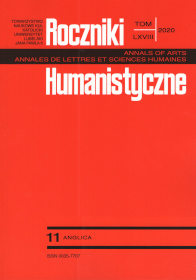“Beautiful And Terrible”: The Ambiguity of the Grid and Suburban Space in D. J. Waldie’s Holy Land: A Suburban Memoir
Abstract
The present paper reassesses D. J. Waldie’s 1996 memoir Holy Land: A Suburban Memoir as an intervention against the jaundiced portrayal of the United States suburbs as a place of alienation. I will argue that Waldie’s account of Lakewood, California, which he presents as a sacred place epitomised by the suburban grid, provides an insightful example of a refusal to comply with certain hegemonic narratives about space in American culture. For this purpose, I will first explore the way Waldie engages with previous critical work about the suburbs. I will next analyse the twofold attitude the grid triggers in the writer and conclude with a reflection upon the potential status of D. J. Waldie as a post-western writer, arguing that his account of suburban life ultimately manages to escape the stereotypes that prevail in the national cultural imaginary, which depict the United States suburbs either as an Edenic realm of upward mobility or as a soulless place of alienation.
References
Baumgartner, M. P. The Moral Order of a Suburb. Oxford UP, 1989.
Beuka, Robert. SuburbiaNation: Reading Suburban Landscape in Twentieth-Century American Fiction and Film. Palgrave Macmillan, 2004.
Blake, Peter. God’s Own Junkyard: The Planned Deterioration of America’s Landscape. Holt, Rinehart and Winston, 1964.
Buchanan, Ian. Michel de Certeau: Cultural Theorist. SAGE Publications, 2000.
Campbell, Neil. “‘The Compass of Possibilities’: Re-Mapping the Suburbs of Los Angeles in the Writings of D. J. Waldie.” European Journal of American Studies, vol. 6, no. 3, 2011, pp. 1–15. DOI:10.4000/ejas.9424.
Campbell, Neil. The Rhizomatic West: Representing the American West in a Transnational, Global, Media Age. U of Nebraska P, 2008.
Certeau, Michel de. The Practice of Everyday Life. U of California P, 1988.
Comer, Krista. Landscapes of the New West: Gender and Geography in Contemporary Women’s Writing. UNC Press Books, 1999.
Didion, Joan. Where I Was From. New ed., Harper Perennial, 2004.
Fishman, Robert. Bourgeois Utopias. The Rise and Fall of Suburbia. Basic Books, 1987.
Jackson, John B. A Sense of Place, a Sense of Time. Yale UP, 1994.
Jackson, Kenneth T. Crabgrass Frontier: The Suburbanization of the United States. EPUB, Oxford UP, 1985.
Johnson, Tom M. “Lakewood: Portraits of a Sacred American Suburb.” Western American Literature, vol. 46, no. 3, 2011, pp. 272–80. DOI:10.1353/wal.2011.0057.
Kelly, Barbara M. “Expanding the American Dream.” The Suburb Reader, edited by Becky Nicolaides and Andrew Wiese, Taylor and Francis, 2006, pp. 284–90.
Kenyon, Amy Maria. Dreaming Suburbia: Detroit and the Production of Postwar Space and Culture. Wayne State UP, 2004.
Kunstler, James Howard. The Geography of Nowhere: The Rise and Decline of America’s Man-Made Landscape. Simon & Schuster, 1994.
Mitchell, William J. T. Landscape and Power. U of Chicago P, 2002.
Mumford, Lewis. The City in History. Harcourt Brace Jovanovich, 1961.
Relph, Edward C. Place and Placelessness. Pion, 1976.
Sharpe, William, and Leonard Wallock. “Bold New City or Built-Up 'Burb? Redefining Contemporary Suburbia.” American Quarterly, vol. 46, no. 1, 1994, pp. 1–30.
Tuan, Yi-Fu. Space and Place: The Perspective of Experience. U of Minnesota P, 2011.
Turner, Frederick Jackson. The Frontier in American History. U of Arizona P, 1986.
Turner Smith, Carissa. “D. J. Waldie’s Holy Land: Redeeming the Spiritual Geography of Suburbia.” REN, vol. 64, no. 4, 2011, pp. 307–24.
Venturi, Robert, et al. Learning from Las Vegas: The Forgotten Symbolism of Architectural Form. MIT Press, 1988.
Waldie, D. J. Holy Land: A Suburban Memoir. W. W. Norton & Company, 2005.
Waldie, D. J., and Neil Campbell. “‘An Assemblage of Habits’: D. J. Waldie and Neil Campbell—A Suburban Conversation.” Western American Literature, vol. 46, no. 3, 2011, pp. 228–49. DOI:10.1353/wal.2011.0066.
Copyright (c) 2020 Roczniki Humanistyczne

This work is licensed under a Creative Commons Attribution-NonCommercial-NoDerivatives 4.0 International License.





